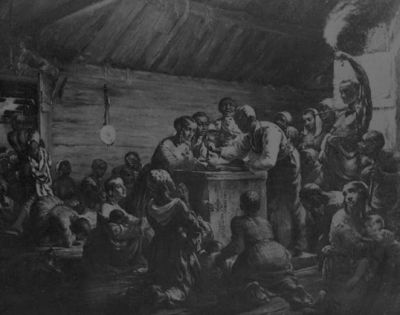 Candles burn late into the night, signifying the coming of a new era in American history: “freedom’s eve,” the beginning of the exodus story of African slaves. Northern free blacks and abolitionists, as well as thousands of freedmen in Union-controlled areas of the South, unable to sleep in anticipation of the morrow’s Emancipation Proclamation, gather in churches and homes to count down the hours and minutes to the legal liberation of slaves in the Confederacy. For their part, many enslaved blacks (including members of the First African Baptist Church of Savannah) quietly celebrate, not wanting to alert their masters (who have no intention of complying with Abraham Lincoln‘s proclamation), but daring to believe that their salvation is nigh.
Candles burn late into the night, signifying the coming of a new era in American history: “freedom’s eve,” the beginning of the exodus story of African slaves. Northern free blacks and abolitionists, as well as thousands of freedmen in Union-controlled areas of the South, unable to sleep in anticipation of the morrow’s Emancipation Proclamation, gather in churches and homes to count down the hours and minutes to the legal liberation of slaves in the Confederacy. For their part, many enslaved blacks (including members of the First African Baptist Church of Savannah) quietly celebrate, not wanting to alert their masters (who have no intention of complying with Abraham Lincoln‘s proclamation), but daring to believe that their salvation is nigh.
As Lincoln prepares to sign the Emancipation Proclamation, the narrative of the war is poised to change. To date, everyone North and South acknowledges African slavery as the cause of and reason for the war, while Lincoln has assuaged Northern anti-war Democrats by publicly framing the conflict as a fight to preserve the United States. But with the stroke of a pen soon expected, the war will officially become a fight for human freedom and liberation. Upon the signing of the Proclamation, the Union Army will begin a systematic effort to free slaves within the Confederacy. The U.S. government will soon print pocket guides of the Emancipation Proclamation for Union soldiers to distribute among Southern slaves.
Tonight, in dozens of Baptist churches across the North and Union-controlled South, congregations white and black await with mounting excitement for the moment a new Moses will free millions of enslaved persons. This “watch night” will be forever remembered and celebrated by African Americans as the hour of God’s deliverance.
In a contraband (freedmens) camp on the outskirts of the nation’s capital, a former slave rejoices at freedom’s coming:
Onst the time was, dat I cried all night. What’s de matter/ What’s de matter? Matter enough. De nex mornin my child was to be sold, an she was sold, and I neber spec to see her no more till de day ob judgment. Now, no more dat! No more dat! No work, when de overseer used to whip me along. Now, no more dat! No more dat! Nor more dat! When I tink what de Lord’s done for us, an brot us thro’ de trubbles, I feel dat I ought go inter His service. We’se free now, bress de Lord! (Amens! were vociferated all over the building.) Dey can’t sell my wife and child any more, bress de Lord! (Glory! Glory! From the audience.) No more dat! No more dat! Nor more dat, now! (Glory!) Preserdun Lincum have shot de gate!
Among those gathered, there is much singing. New lines are added to an old biblical song:
Go down, Moses,
Way down in Egypt land,
Tell old Pharaoh,
Let my people go.Go down, Abraham,
Away down in Dixie’s land
Tell Jeff Davis
To let my people go.
Sources: “African American Odyssey: The Civil War, Part 1,” Library of Congress (link); Jacqueline Jones, “The Emancipation Proclamation Reaches Savannah” (link); image (link); image of pocket guide to Emancipation Proclamation (link); “Preparation for the Final Proclamation” (link)


